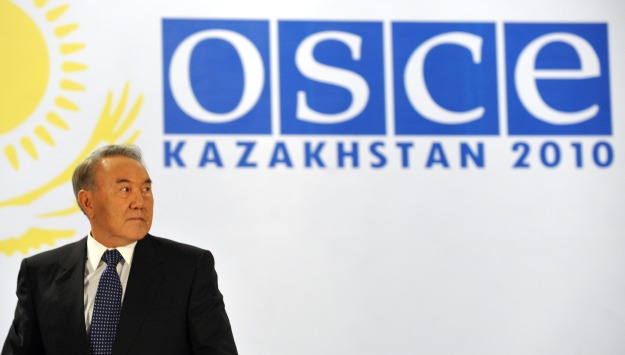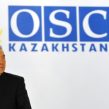
Astana OSCE Summit Ends in Division
Publication: Eurasia Daily Monitor Volume: 7 Issue: 223
By:

International attention focused on Astana on December 1-2, where the leaders of the 56 member-countries gathered for the Organization for Security and Cooperation in Europe (OSCE) summit, billed by the Kazakh government as an “epoch-making event.” Kazakhstan ended its chairmanship of the organization in a grand way, mobilizing for the heightened security of the summit, battalions from its peacekeeping forces and units of an airborne assault brigade, including more than 1,200 military officers and servicemen. Despite the unprecedented public relations campaign surrounding the summit, intended to boost the image of the country, it yielded little actual progress. None of the complicated issues on the agenda of the summit, including Karabakh, or the standoff between Georgia and Russia, the self declared Transnistria republic and Moldova, drew any closer to a comprehensive solution.
Russian President, Dmitry Medvedev, and his Georgian counterpart, Mikheil Saakashvili, contributed to the tense atmosphere of the summit with their reciprocal accusations. The Russian leader reiterated the necessity of adopting a new agreement on security in Europe, the idea harbored by Moscow over the past two years, but balked at signing the final declaration of the summit that stressed the territorial integrity of Georgia and the inviolability of its borders which existed before the Russia-Georgia conflict. Russian Foreign Minister, Sergey Lavrov, told journalists in an irritated manner that “there can be no talk whatsoever of the territorial integrity of Georgia within its former boundaries” (www.gazeta.ru, December 2).
Mikheil Saakashvili walked out of the session as Dmitry Medvedev rose to the podium to denounce Georgian aggression. When the Georgian president appeared for his speech expressing his readiness to talk with the Russian leadership, Medvedev was on his plane home.
The summit did not provide a clear-cut answer to the solution of the Transnistria conflict. Moldovan Deputy Prime Minister, Viktor Ossipov, called on the international community to persuade the authorities in Transnistria to return to the negotiating table in the 5+2 format proposed by the EU in order to approach the issue of its integrity on the basis on the sovereignty of Moldova. Ossipov also stressed that the presence of Russian troops and military hardware on Moldovan soil violates Moldova’s constitution, as well as international law, and therefore should be withdrawn. Chisinau believes that the ongoing militarization of the Transnistria region contributes to rising criminality and aggravates the already fragile situation. But this was flatly rejected by the foreign ministry of the Transnistria republic as an “unsubstantiated accusation” (Komsomolskaya Pravda, December 2).
One of the few tangible results of the summit was perhaps the joint declaration on the Karabakh conflict settlement by the Minsk group of the OSCE (Russia, US, France, as well as Armenia and Azerbaijan). Yet, pessimism and mutual distrust prevail both in Armenia and Azerbaijan. Armenian Foreign Minister, Edward Nalbandian, referring to the November 2, 2008 Moscow declaration, supported the Russian president’s thesis on the non-use of force in settling regional conflicts, which Medvedev also reaffirmed during the OSCE summit (Armenia Today, December 4).
Apparently, the “non-use of force’ terminology is a convenient phrase as Armenia attempts to preserve the present status quo in Karabakh. At the same time, the OSCE did very little to broker peace between the conflicting sides and reach a solution to the long-running issue. In Astana, the previously planned talks between Armenian President, Serzh Sargsyan, and his Azerbaijani counterpart, Ilham Aliev, mediated by OSCE officials did not take place. The two leaders could hardly find common ground. As Tabib Gusseinov from the Baku-based International Crisis Group observed, the presidents of Armenia and Azerbaijan have already expended their resources to find a compromise solution, and the attempt by the mediators to arrange such a meeting in Astana was totally futile (Kavkazsky-Uzel, December 3).
Assuming the chairmanship of the OSCE, Kazakhstan accepted commitments to contribute to the peaceful solution of complicated issues in hot spots. Even if Kazakhstan did not facilitate its short-term objectives on Karabakh, Transnistria region and the South Caucasus, it is not to blame for such failures. The root of the problems lie with the OSCE itself, perceived by many as an obsolete, bureaucratic and ineffective structure, unprepared to deal with prolonged conflicts in the post-Soviet space (Delovaya Nedeli, December 3).
Many speakers at the summit, including US Secretary of State, Hillary Clinton, deservedly praised the efforts of Kazakhstan to render humanitarian assistance to Afghanistan. Currently 155 young Afghans are being trained in Kazakhstan’s universities, and Kazakhstan was the first Central Asian state to join the international security assistance forces (ISAF) in Afghanistan. Against the background of the prevailing sense of dissatisfaction with the outcome of the summit, for Kazakhstan it was yet another chance to secure international publicity: an opportunity it exploited to the fullest.




